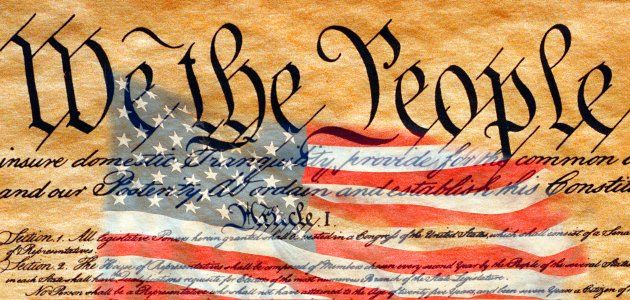
If there is an aspect of the human condition that is unaddressed by the platform of the Republican Party of Iowa, adopted last month at the state convention in Des Moines, you'd have to look awfully hard to find it. Its 387 enumerated planks and principles range widely over politics, culture, and economics, from sweeping statements of belief ("America is good") to the fine nuances of agricultural policy ("We support the definition of manure as natural fertilizer") and touching on the mythical "North American Union" (against) and the gold standard (for). Even so, it's a little startling to come upon section 7.19, which calls for "the reintroduction and ratification of the original 13th Amendment, not the 13th amendment in today's Constitution." Since the existing 13th Amendment bans slavery, while the "original" one was about something else entirely, the wording might give the impression that Iowa Republicans wish to reverse emancipation, which is not at all the case, according to state GOP Communications Director Danielle Plogmann. Like many aspects of Republican politics this year, it's actually about embarrassing President Obama. But you have to wonder whether the delegates knew what they were getting into. In making common cause with "Thirteenthers," as those who seek to restore the long-lost amendment are known, the party has ventured beyond the far fringes of conspiracy theory, into a mysterious lost land without lawyers or taxes. Maybe they knew what they were doing after all.

Return with us now to the tumultuous years leading up to the War of 1812, when fear of "foreign influence"—by England or France, depending on whether you were a Republican or Federalist—was a dominating issue in American politics. Jerome Bonaparte, the younger brother of Napoleon, had recently spent several years in the United States, where he married Elizabeth Patterson, the beautiful, ambitious daughter of a wealthy Baltimore merchant. In 1810, Jerome was on the throne of Westphalia, while Elizabeth was in America with their son, Jerome Napoleon. (The couple would never see each other again.) According to historian Michael Vorenberg of Brown University, having a nephew of the emperor of France growing up on American soil might have made the pro-British Federalists uneasy, or, just as likely, suggested to them a way to tie the Republicans to the French Legion of Honor, the Trilateral Commission of its day. Desiring to get out in front of the issue—or possibly seeking to score points against the Federalists, who had their own embarrassing ties to the British aristocracy—Republican Sen. Philip Reed of Maryland introduced an amendment meant to strengthen the existing "emoluments clause" in Article I, Section 9, of the Constitution.
This clause reads:
"No Title of Nobility shall be granted by the United States: And no Person holding any Office of Profit or Trust under them, shall, without the Consent of the Congress, accept of any present, Emolument, Office, or Title, of any kind whatever, from any King, Prince, or foreign State."
Reed's proposed amendment extended the ban from office-holders to "any citizen of the United States" and made the penalty loss of citizenship:
"If any citizen of the United States shall accept, claim, receive or retain any title of nobility or honour, or shall, without the consent of Congress accept and retain any present, pension, office or emolument of any kind whatever, from any emperor, king, prince or foreign power, such person shall cease to be a citizen of the United States and shall be incapable of holding any office of trust or profit under them, or either of them."
Reed's bill passed both houses easily, and as of Dec. 9, 1812, had been ratified by 12 states and seemed headed for adoption, at which point war intervened. Here, histories diverge. The mainstream view is that the "Titles of Nobility Amendment" (TONA) never achieved the necessary 13 ratifications—three quarters of the 17 states as of 1810—and fell further behind as more states joined the union. That ought to have been the end of it, says Jol A. Silversmith, a lawyer in private practice who has written the definitive account of the "missing amendment." And so it was until the 1980s, when a conspiracy-minded researcher named David Dodge came across an 1825 copy of the Constitution including this provision. Further research led Dodge to conclude that TONA had been ratified by Virginia no later than 1819 and was an accepted, if largely unnoted, part of the Constitution from then until its mysterious disappearance around the time of the Civil War.
If you find it hard to believe that an amendment to the Constitution could have been in effect for four decades and then mysteriously excised and forgotten, well, the times were different. There was no single reference copy of the Constitution to which scribes with quill pens ceremoniously added amendments as they were ratified. Dodge claims to have turned up numerous pre–Civil War copies of the Constitution containing the missing amendment, but that doesn't add up to proof. Even Congress was confused about the status of TONA and requested clarification from President James Monroe, who turned the question over to Secretary of State John Quincy Adams, who reported that it had not been ratified. The evidence that Virginia ever did approve TONA is circumstantial, but, as Silversmith points out, it's also irrelevant, because already by April 30, 1812, with the admission of Louisiana, ratification required 14 states (of 18). To hang the argument on what Virginia may have done in 1819 assumes that adoption required ratification only by three quarters of the states in the union at the time the amendment was submitted in 1810, i.e., 13 of 17. That view has had its adherents over the centuries, but apart from its inherent illogic—surely the high hurdle the Founding Fathers erected to Constitutional amendments wasn't meant to shrink as the country grew—we now have a clear precedent that establishes the opposite. That's the 27th Amendment (on Congressional pay), which was proposed in 1789 but was deemed ratified only in 1992 when it was passed by 38 states—three quarters of 50, not of 13.
In the world of the Thirteenthers, though, it's all a conspiracy, and the leading suspects are those shady characters who put "esquire" after their names. To quote the Web site Constitutional Concepts, "This Amendment was for the specific purpose of banning participation in government operations by attorneys and bankers who claimed the Title of Nobility of 'Esquire.' These people had joined the International Bar Association or the International Bankers Association and owed their allegiance to the King of England." In other words—well, we're not sure how to explain it any better, but Constitutional Concepts CEO Jim Barrus says in an e-mail that enforcement of the 13th Amendment would strike a blow against "the elected politicians who have grand plans of ruling every facet of America," and would essentially delegitimize virtually every act of the federal government since 1819. Who wouldn't want that?
Naturally, most lawyers see it differently. "The esquire thing is ridiculous," says R. B. Bernstein, a professor at New York Law School and author of Amending America. "'Esquire' is not a title of nobility. Back then, they were worried about people accepting literal titles of aristocracy that convey land or privileges, things you can leave to your kids." Lawyers obviously command certain privileges, but they are not inherited.
There are, of course, other implications of Thirteenthism, such as ensuring that the United States never again suffers the humiliation of having a president win the Nobel Peace Prize. That was just what the Iowa Republicans had in mind, according to Plogmann, who wrote in an e-mail that the plank "was meant to make a statement about the delegates' opinion about Mr. Obama receiving the prize." (Presumably they didn't mind if, in the process, they were also making a statement about any American scientist or writer unlucky enough to win a Nobel.) Unfortunately for them, the Department of Justice looked into whether Obama needed Congressional approval to accept the Nobel under the existing emoluments clause, and based on the meaning of "foreign state" (which would not cover the Nobel Prize Committee) concluded that he did not.
But they could be playing with fire. "We're in a constitutional silly season," says Bernstein, "and whether you are of the left or the right, if you take the Constitution seriously, it's very troubling." The threat posed by the 13th Amendment is remote; as far as can be determined, no other state has followed the Iowa GOP in calling for ratification, and no bill of ratification has been introduced into the Iowa legislature. As far as their platform goes, we should all be willing to defer to Iowa Republicans on the definition of manure as natural fertilizer. So long as they keep it on the fields, where it belongs.
Uncommon Knowledge
Newsweek is committed to challenging conventional wisdom and finding connections in the search for common ground.
Newsweek is committed to challenging conventional wisdom and finding connections in the search for common ground.
About the writer
To read how Newsweek uses AI as a newsroom tool, Click here.






